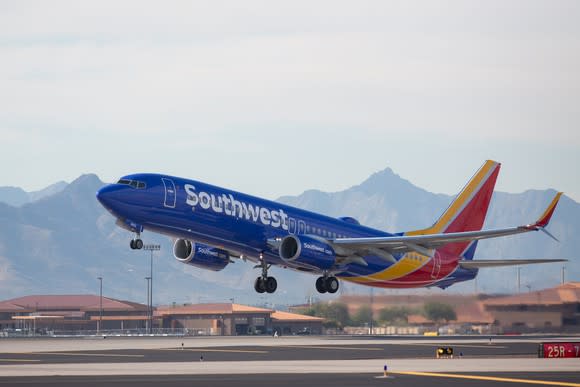Southwest Airlines Co. Slashes First-Quarter Guidance
Shares of U.S. airline giant Southwest Airlines Co. (NYSE: LUV) slumped on Wednesday after the company reduced its unit revenue outlook for the first quarter. This was disappointing, given that Delta Air Lines (NYSE: DAL) and United Continental (NYSE: UAL) -- another two of the four airlines that dominate the U.S. industry -- raised their Q1 unit revenue outlooks earlier this month.
That said, Southwest Airlines will still be one of the most profitable airlines in the U.S. for the first quarter. Furthermore, the company is poised to build on its success over the next year or two as it revamps its fleet and capitalizes on the enhanced capabilities of its new revenue management system.
Southwest revises its guidance
In late January, as part of its fourth-quarter earnings report, Southwest projected that revenue per available seat mile (RASM) would rise 1% to 2% in the first quarter. Southwest also predicted that its adjusted non-fuel unit costs would increase 0.5% to 1.5% this quarter, while its average fuel price would tick up to $2.10 to $2.15 per gallon, compared to $1.96 per gallon a year ago.
However, unit revenue trends have deteriorated recently, particularly during off-peak periods in March. As a result, Southwest now expects RASM to be roughly flat year over year for the full quarter. On the bright side, costs are set to come in slightly better than expected this quarter, with non-fuel unit costs up 0% to 1% and an average fuel price of about $2.10 per gallon.

Southwest has experienced choppy unit revenue trends recently. Image source: Southwest Airlines.
The weakening unit revenue trends outweighed the better cost trends in investors' minds. As a result, Southwest Airlines stock declined by 5% on Wednesday.
Stiff competition continues
In a research note published on Wednesday, airline analyst Helane Becker posited that United Continental's aggressive growth plan caused the recent unit revenue weakness at Southwest. She noted that adding capacity during non-peak periods is a key piece of United's growth strategy, and that this lines up with Southwest Airlines' description of recent unit revenue trends.
That said, most of United's growth focus is on small cities where Delta and American Airlines tend to be its only competitors. Southwest almost exclusively flies to cities with metro area populations of at least 500,000.
Another big piece of United Airlines' growth this quarter has been on routes to Hawaii. While Southwest Airlines plans to enter that market within the next year, it doesn't fly to Hawaii today.
In fact, Southwest Airlines just seems to be experiencing a continuation of the trends that have dogged the airline industry for more than a year. Aggressive efforts by United and American -- and, to a lesser extent, Delta -- to match ultra-low-cost carriers' fares have sparked broader fare wars. These tend to be more severe during off-peak periods, when it is harder to keep planes full.
Should investors be worried?
To the extent that its biggest rivals start directing more of their growth to small cities in the U.S. and international routes, Southwest may face less competitive pressure going forward. The company claims that it still expects to achieve RASM growth on a full-year basis in 2018, driven in part by benefits from its new revenue management system.
Additionally, despite the recent unit-revenue setback, Southwest is still poised to achieve a double-digit operating margin in the first quarter. None of its legacy-carrier peers will get anywhere close to that level of margin performance.
On the flip side, Southwest is facing its easiest unit-revenue comparison of the year this quarter. This suggests that even if RASM starts growing again later in 2018, it may not increase by very much. And while Southwest is much more profitable than its legacy-carrier rivals, that discrepancy is already reflected in its stock price.
In the long run, Southwest should be fine. It has a winning combination of affordable fares, strong positions in many top markets, and friendly customer service. That's a recipe for industry-leading profitability and continued market share gains.
More From The Motley Fool
Adam Levine-Weinberg owns shares of Delta Air Lines. The Motley Fool has no position in any of the stocks mentioned. The Motley Fool has a disclosure policy.
